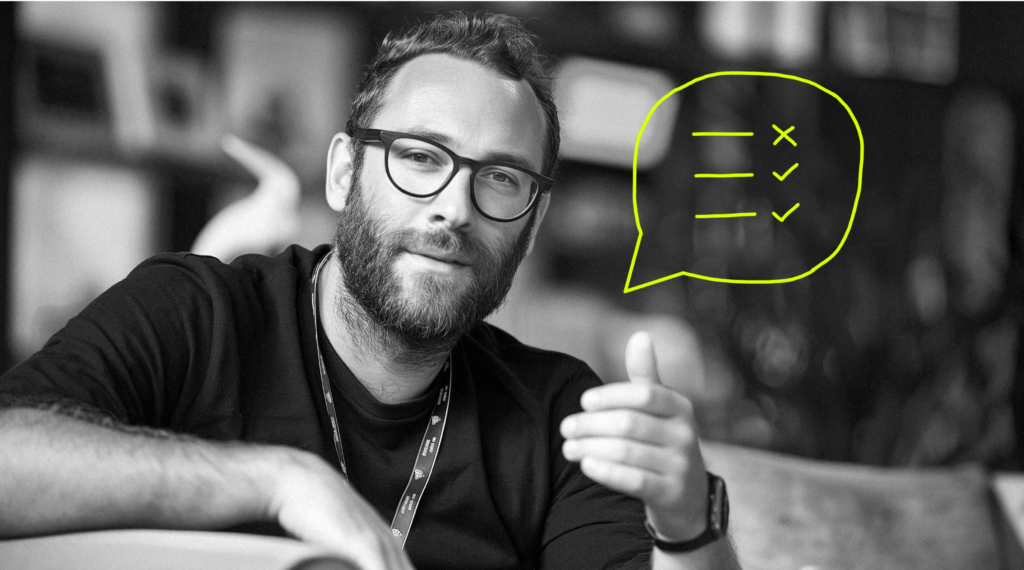Introduction
Venture capital has come to define Silicon Valley and tech startups. Founders compete to see who can build the next unicorn with a stratospheric market cap.
In fact, for many founders, it’s become the only way to build a startup.
- Hatch a big idea
- Raise funds
- Burn money growing
- Rinse and repeat

For some startups, this process leads to valuations that would be impossible to reach by any other way. But for many others, this fixation has cratered businesses and caused endless stress.
For Rand Fishkin, founder & ex-CEO of Moz and author of ‘Lost and Founder’, the pressure to become a unicorn led him to make decisions he regrets to this day – like turning down a $25M M&A offer from Hubspot in 2011.
In our conversation with Rand, he revealed what his Moz experience taught him, along with an alternative way to startup success that sidesteps the downfalls of the prevailing VC narrative.
“99% of the guests who are invited onto 99% of the shows, who write 99% of the books about startup land, they are all gonna tell you the opposite of what I do and I think it’s bad advice,” Rand said.

I just don’t think the numbers bear it out. You know, it’s sort of saying, here’s how I won the lottery and you can too.
Rand’s rollercoaster ride through startup land
Unlike most founders, Rand’s first business partner was his mom. Together, they built a marketing company, went deep into debt, and wound up starting a blog that would become SEOMoz.
After raising series A and B funding, they found success that exceeded their expectations.
By 2011, Moz was doubling in size year over year, and on track to make $10M. That’s when Hubspot offered $25M for the company.
The offer was roughly 2.5X the company’s yearly revenue, but Rand, still set on the trajectory of go big or go home, thought $40M, roughly 4X, was more in line with the market.
Rand left himself no room to negotiate down, and ended up saying no to the deal – a decision he regrets to this day.
For three more years, Rand was happy with his choice and the growth of his company. But then Moz plateaued. Soon Rand stepped down/was forced down from his role as CEO, leaving the company soon after.
Later that year, investment bankers sold Moz.
Today, Rand runs SparkToro, a startup focused on profit and serving employees and customers first, then investors. To help change the growth-before-everything narrative for startups, Rand has open-sourced his funding documents to help founders raise money better.
5 secrets nobody likes talking about in startup land

Unicorns are for investors, not founders

VC math is the startup lottery

Profit creates stability, which helps you make better decisions

There is success outside the narrow confines of short-term growt

It’s OK to sell early
Unicorns are for investors, not founders
Building a unicorn startup is the dream of most founders. You put your life on pause, sacrificing relationships, social life, and sleep in the hopes of becoming the next Google.
In fact, a $1bn valuation has almost gravitational weight in the startup world today. If you don’t chase unicorn growth, many will deride your startup as a ‘lifestyle business’.
The truth is that hyperfocusing on becoming a unicorn is not an intrinsic part of startup culture. It’s the goal of VCs.
“If you’re a venture capital firm, you have hundreds of millions of dollars under management and you need to beat market rate of returns. So, you’ve got to get, you know, whatever your 12% compound annual growth to do that,” Rand said.

If you’re a VC, you’re almost certainly going to need a few companies that are worth billions of dollars in unicorns and exit for a huge amount.
While this hustle to become the next unicorn has become the norm, when you take a second to look around, you can see plenty of successful startups that didn’t take the traditional raise-and-burn route.
Mailchimp is a premiere example of a successful company that didn’t take a cent of VC money.
Broaden those terms to non-startup companies and there are suddenly an almost unlimited number that found success (and made people rich) that didn’t need VC money to get there.
- GoPro
- Groove
- Github (which only raised money when they were profitable and successful)
For money or love
For Rand, and many other founders, the real joy of building a startup is to create something new and serve customers well.
“I love being able to serve customers instead of potential acquirers,” Rand said.

It is, it is so freeing to just worry about how do I make my product better, how my service better, how do I serve people better?
That is really fulfilling. I think founders get into this business because they love [serving customers]. There’s something in the world that doesn’t exist today and they want to make that thing exist. They think it can be transformative and helpful to a bunch of people.
VCs need unicorn startups, but startups don’t need VCs.
VC math is the startup lottery
VCs need unicorns to make their math work, as mentioned above. To capture those white whales, VCs place bets on one hundred companies – most of which will fail.
For every hundred companies a VC invests in, they expect to write off over 75%. And they’re ok with it because 1 will become a Unicorn.
Rand calls it VC math.
This pressure to make the VCs math work makes it difficult for founders to have a realistic goal because a good company is not enough for VCs. The only thing that moves the needle is their unicorn. So, founders are often told to dream bigger, to think broader.
To take their dream and 10X it.
And it works.
“I think the problem is all of us believe that we’re the special one,” Rand said. “We’re the unique one. We’re the one that’s going to stand out and we have to believe that so that we can pitch investors on why they should believe in us and trust us with their money.”
So instead of creating a business that makes sense below a $1B valuation, founders will pitch their ideas to VCs who will only invest when the company has the potential, leadership, and grow-at-all-costs plan to become a unicorn.
Even if that’s not what the founder wants.
“Many, many founders in my experience want to build long-term profitable businesses,” Rand said. “They think they might be worth, you know, tens of millions or hundreds of millions of dollars someday if the company’s successful. But in the near term, trying to maximize that growth rate and blow out the metrics to convince the next round of investors to invest is exactly what kills them.”
Trusting in VC math and shooting to become a unicorn or bust is like betting your future on a lotto ticket.
Profit creates stability, which helps you make better decisions
Chaos is part of the startup mantra – move fast and break things.
Many founders seem to thrive in this environment, shuttling from crisis to funding to massive growth and back again. We call it a ‘fast-paced’ environment and brag about it in our recruitment ads.
But just like the idea of unicorns, this constant push for growth at all costs, whether that’s mental health, relationships, or debt, isn’t a natural part of a startup. It’s caused by pressure from VC’s need for unicorns.
Rand’s ‘Moz’ story is filled with these moments of chaos and fiscal pressure.
“I think founders, myself included, when you feel those moments of desperation, that’s when you make your worst decisions,” Rand said.
In Rand’s Chill Work Manifesto, he outlines how he’s doing things differently this time.
And while that includes a work/life balance, it also focuses on building a profitable, long-lasting business. Because that profit gives founders the space to make better decisions.

I don’t think a lot of people realize how massively having secure finances changes your decision-making for the better. It makes you more calm and thoughtful and you don’t feel panicked.
Profit gives you space to make better decisions and leverage to stay in control of your startup.
There is success outside the narrow confines of short-term growth
Another consequence of VC math is that all success is not equal in startup land.
Profit, for example, is not valued as highly as growth. That means a high churn rate is poison, even if those clients that leave often come back. Because when you’re dealing with funding rounds and VCs, you often don’t have the opportunity to look at the big picture.
Instead, your vision is chopped up into funding rounds, which means you need short-term wins to sell investors. So you can get your next round funded and continue to grow.
“Because of the weird way that those investors think, it biases startups to do all sorts of things like, try and make your product really hard to quit or, you know, try and get installed software so it’s a pain in the butt to try and get off of it or make the platform non-interoperable,” Rand said.

All these dark patterns that companies are encouraged to use because founders need to raise money and the venture investors want you to do things.
This narrow definition of success continues beyond funding rounds to M&A.
You’re building a company and a life. VCs are building a portfolio.
It’s OK to sell early
The idea of building a unicorn feeds the ego. For many founders, it means you won the game.
Meanwhile, selling before that unicorn valuation can feel like a loss. You built this business, grew with it, and if it’s your first, you may even feel like it defines you.
And so, you hold on because it feels so valuable to you (it’s a bias known as the endowment effect).
“I had a ton of fear that Moz was my only good idea and it was the only company I could ever build,” Rand said. “So I wanted to hold onto it.”
So, he let a great acquisition offer go.
Looking back, he still regrets it, not because the stocks in Hubspot could have inflated the purchase price well above even what Moz was sold for ten years later, but because he missed a chance to change people’s lives for the better.
“That money [from the Moz deal] would have been transformative for not just myself but a lot of people in my family, my team and world,” Rand said.
And, as he found out with his two new businesses, there is still life after your first startup.

“Life is long, you get to start lots of companies. You can do this many times.
$1B is not a magical number. Accepting even $1M and starting again can be just as life-changing.
You don’t need to be a unicorn
Some startup founders are lucky. They are able to start their company without investors and grow it slowly to find stable success.
But most founders aren’t so lucky. They’ll need different levels of investment to bring an MVP to market. Some will make do with angel investor funding (like SparkToro does), while others will need to accept money from VCs.
The problem isn’t how your startup is funded. The problem comes when you allow your culture to be dictated solely by the needs of investors, instead of the needs of your employees, your customers, yourself, and then your investors.
While some founders are forced to cede control during funding rounds, many are still chasing the VC’s dream because that’s the way they think it’s done.
“I think the dirty secret is you don’t have to do it,” Rand said. “Most venture investments, the investors cannot force you to sort of take those kinds of actions.”

We all do it because we’re culturally ingrained with that mentality. But you can get off that treadmill.
You can raise your first round of venture. And then build your business to be profitable and survive for a long time to see where the business can take you.
You are the founder. Build your business your way.










